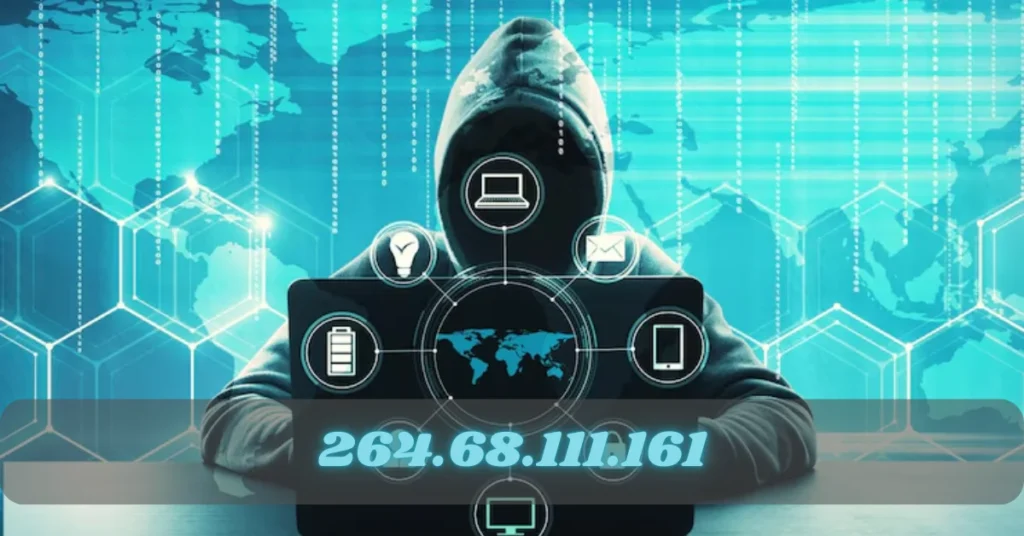Introduction
Ever looked at a number like 264.68.111.161 and wondered what it actually means? You’re not alone. In today’s hyper-connected world, every click, search, and stream is powered by a number like this—your IP address. This seemingly random set of digits holds immense power in shaping how you access information, how secure your devices are, and how the internet sees you.
But here’s the twist: 264.68.111.161 isn’t even a valid IP address. Wait, what? Yes, we’ll dive into that and more. Ready to understand how IP addresses quietly rule your digital life?
Understanding IP Addresses
What Are IP Addresses?
An IP (Internet Protocol) address is like your home address, but for your device on the internet. It tells other devices where to send information so you can receive websites, emails, and apps.
IPv4 vs. IPv6
Most IPs we see—like 192.168.1.1—are IPv4, which uses 32-bit numbers. However, with billions of devices online, we’re running out of IPv4 addresses. That’s where IPv6 comes in, using 128-bit numbers to allow trillions of unique addresses.
Public vs. Private IP Addresses
- Public IP: Assigned by your ISP, visible to the outside world.
- Private IP: Used within your local network (think: your home Wi-Fi).
The Significance of 264.68.111.161
Breaking Down the IP Address
IP addresses have strict numerical rules. In IPv4, each number in the quartet (called an octet) must be between 0 and 255.
Is 264.68.111.161 a Valid IP?
Nope. The first number—264—exceeds the maximum allowed value of 255 in IPv4. This means 264.68.111.161 is technically invalid and cannot exist in the real world.
Why This Specific IP Might Raise Questions
Sometimes, these kinds of IPs appear in logs due to typos, spoofing, or misconfigured systems. If you see 264.68.111.161 show up somewhere, it might be a red flag.
How IP Addresses Work
How Your Devices Get IP Addresses
When your device connects to the internet, your ISP assigns a public IP, while your router assigns private IPs to your devices using DHCP (Dynamic Host Configuration Protocol).
The Role of ISPs
Your Internet Service Provider is like your digital gatekeeper—they assign your IP and can log every move you make online.
Dynamic vs. Static IPs
- Dynamic: Changes every time you reconnect.
- Static: Stays the same; often used by businesses or servers.
Your Digital Identity & IP Addresses
How IPs Track Your Online Behavior
Websites log your IP to understand visitor location, behavior, and habits. Ever seen “You’re viewing from New York”? That’s IP geolocation in action.
Geolocation and User Profiling
Marketers and analysts use IP data to build digital profiles. Creepy? Maybe. Powerful? Definitely.
Cookies vs. IP Tracking
Cookies track your browser activity. IP tracking, on the other hand, is deeper—it tags your entire network.
Security Implications of IP Addresses
How Hackers Exploit IPs
With just your IP, malicious users can launch:
- DDoS attacks (flooding your device with traffic)
- Port scans to find vulnerabilities
- Spoofing attempts to impersonate you
What Someone Can Do With Your IP
They can’t steal your identity directly—but they can make your life harder, slow down your internet, or even try to access unsecured devices.
Spoofing and DDoS Attacks
Spoofing fakes IP identities. DDoS (Distributed Denial of Service) floods your network to knock you offline.
Access Control via IP Addresses
IP Whitelisting and Blacklisting
Sites and services use whitelists to allow only specific IPs and blacklists to ban suspicious ones.
Firewalls and IP Filtering
Your firewall monitors IP traffic and blocks anything sketchy.
VPNs and Proxies for Access Control
These tools disguise your IP, letting you bypass geo-blocks or censorship.
IP Addresses and Online Privacy
How Exposed Are You?
If you’re not using a VPN, your IP is out in the open every time you go online.
Tools to Check Your IP Footprint
Websites like “WhatIsMyIP” or “IPLeak.net” show you exactly what info you’re giving away.
Using VPNs to Mask Your IP
A VPN routes your connection through a secure tunnel, hiding your real IP and encrypting your traffic.
Regulatory and Legal Aspects
IP Logging and Data Retention
ISPs and websites keep logs of your IP history. This info can be used in investigations.
GDPR and IP Addresses
In the EU, IP addresses are considered personal data, protected under GDPR laws.
Law Enforcement and IP Subpoenas
Authorities can subpoena your IP history from ISPs in criminal cases.
Misconceptions About IP Addresses
Can Someone Hack You with Just an IP?
It’s not easy, but possible if your system has vulnerabilities.
Are IPs the Same as Email or MAC Addresses?
Not at all. Your email is tied to your identity. A MAC address is tied to your device. Your IP is about location on a network.
IP Reputation and Blacklists
How IPs Get Blacklisted
Spamming, malware hosting, or too many failed logins can get your IP blacklisted.
Email Servers and IP Reputation
Poor IP reputation can land your emails in the spam folder.
Tools to Check Blacklists
Use tools like MXToolbox or Spamhaus to check if your IP is blacklisted.
Business Use of IP Addresses
IP-Based Marketing and Targeting
Businesses use your IP to deliver local ads and offers. Ever searched for a restaurant and saw results nearby? That’s IP targeting.
Geo-Fencing Using IPs
Some services offer/limit features based on your physical IP location.
Controlling Access to Digital Assets
Companies protect data by allowing only authorized IPs to access sensitive tools or dashboards.
Home Network and IP Addressing
Router-Assigned IPs
Your router dishes out private IPs to phones, laptops, smart devices at home.
Internal vs. External IPs
Your devices have internal IPs (e.g., 192.168.0.1) while the router has an external one facing the web.
Port Forwarding and Security
This allows outside access to a device within your home network—great for gaming, but risky if misconfigured.
Tips to Secure Your IP Address
- Use a VPN (seriously, just do it)
- Enable a firewall
- Avoid clicking on shady links
- Don’t share your IP publicly
- Regularly restart your router
The Future of IP Addressing
IPv6 and the End of IP Scarcity
With IPv6, there’s no running out. Every grain of sand on Earth could have an IP—and then some.
AI and Smarter IP Management
AI is helping ISPs manage IP allocation, detect threats faster, and optimize network performance.
Conclusion
Your IP address is more than a number—it’s a digital passport, security gate, and tracking beacon all rolled into one. Whether it’s 192.168.1.1 or a misfit like 264.68.111.161, understanding how these numbers work helps you browse smarter, stay safer, and protect your digital self in ways you didn’t think possible.






